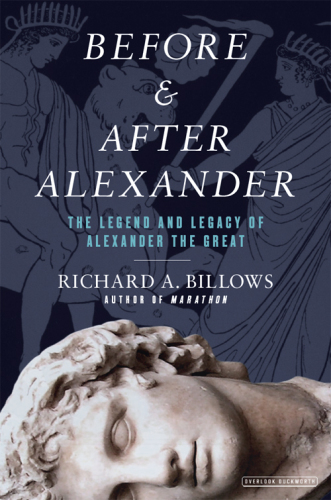
Before and After Alexander
The Legend and Legacy of Alexander the Great
- اطلاعات
- نقد و بررسی
- دیدگاه کاربران
نقد و بررسی

Starred review from May 14, 2018
Columbia University history professor Billows (Marathon: How One Battle Changed Western Civilization) provides a thorough analysis of the legacy of history’s most famous conqueror. According to Billows, Alexander the Great was more of an accident of history than a maker of it, and so he focuses on the transformative eras before and after Alexander’s 13-year reign—Alexander first appears at the book’s halfway point and is gone after a single chapter. Billows argues that Alexander was only able to conquer the lands between Greece and India on the strength of Macedonia’s established military might. It was under the 24-year rule of Alexander’s father, Philip II, that Macedonia became an economic and military power among the Greek city-states; in particular, he introduced and perfected the Macedonian phalanx military formation, which was used to its greatest effect in the wars of Alexander. After a period of civil wars, Alexander’s successors established the Antigonid, Seleucid, and Ptolemaic empires, all of which endured into the Middle Ages and spread Hellenistic culture, the Greek language, and libraries across Europe and Asia. The author meticulously defends his provocative thesis about Alexander’s role with in-depth historical analysis and an array of citations and quotes from primary sources, making this a clear, enlightening exploration of one of the most influential periods of human history.

May 1, 2018
A historian of ancient Greece debunks the greatness of Alexander.Setting the reign of Alexander III of Macedon in the context of his father's and successors' achievements, Billows (History/Columbia Univ.; Marathon: How One Battle Changed Modern Civilization, 2010, etc.) argues persuasively that Alexander "is one of the most overrated figures in world history." After the assassination of his father, Philip II, in 336, 20-year-old Alexander became ruler of Macedonia, inheriting a "strong, stable, prosperous" region, with growing cities and a thriving population, thanks to his father's farsighted policies. Philip left "a loyal and obedient aristocracy and people" and "the best and largest army in the eastern Mediterranean region," led by outstanding officers. Moreover, Philip had groomed his son to take command: Aristotle was among his tutors. Philip's achievements, Billows asserts, far outweigh his son's. When Philip became ruler in 360, at the age of 24, Macedonia was a tribal kingdom, "a country of large landowners" who lorded over "poor pastoralists." Although the region was rich in natural resources, it was "a weak and unimportant backwater" beset by enemy forces. Philip embarked on a campaign of military recruitment, providing his new soldiers with up-to-date equipment, training them rigorously, and commanding a "picked force of elite infantry." In addition, he established schools offering a free education to the sons of aristocrats, fostering camaraderie among the sons and loyalty from their parents. Through both military and civic efforts, Philip unified Macedonia and "created a strong sense of common identity and unity of purpose." Heir to those political riches, Alexander set out to conquer: In a brief reign of 13 years, he conquered all of western Asia, subduing populations already subject to military force. A change in ruler, argues the author, made little difference to them. Violent when drunk, cruel when sober, Alexander "had a dominant personality and large ego." Billows believes he has been unfairly heralded, less deserving of acclaim than his three successors, whose careers the author chronicles.An absorbing revisionist history of the ancient world.
COPYRIGHT(2018) Kirkus Reviews, ALL RIGHTS RESERVED.




دیدگاه کاربران